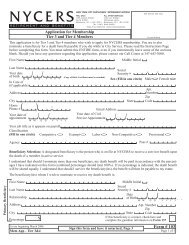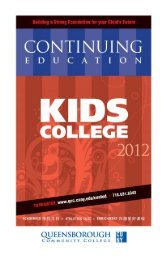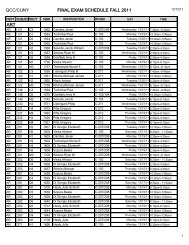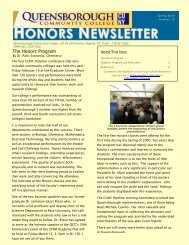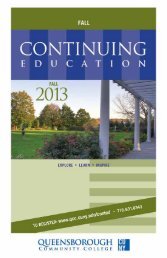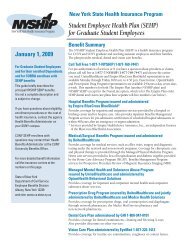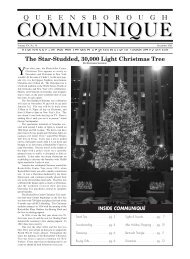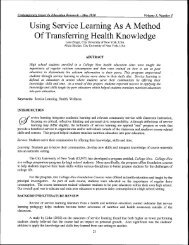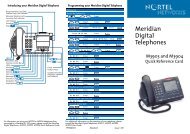Chemical Hygiene Plan - Queensborough Community College ...
Chemical Hygiene Plan - Queensborough Community College ...
Chemical Hygiene Plan - Queensborough Community College ...
Create successful ePaper yourself
Turn your PDF publications into a flip-book with our unique Google optimized e-Paper software.
XV. PESTICIDES<br />
A pesticide is defined as a substance or mixture of substances intended for preventing,<br />
destroying, repelling, or mitigating any pest or intended for use as a plant regulator, defoliant, or<br />
desiccant. Two categories of pesticides are:<br />
1) EPA Registered Pesticides (the EPA registration number can be found on the<br />
manufacturer's label).<br />
2) Those experimental chemicals for which a pesticidal effect has been determined.<br />
All CUNY personnel (including faculty members, staff members, students, and any other<br />
university-affiliated individuals) who label, store, use, transport, dispose of, or clean up spills of<br />
pesticides are responsible for adhering to federal, state and NYC regulations.<br />
It is essential that teaching, research, extension, and ground maintenance involving pesticide use<br />
be conducted properly and legally for the protection of the pesticide applicator, other employees,<br />
staff, students, public health, and the environment.<br />
The responsibility for ensuring that all work with pesticides at CUNY is conducted<br />
properly and legally rests on the individual user.<br />
15.1 Pesticide Certification<br />
CUNY requires that all individuals handling pesticides as a part of university programs must be<br />
NYS certified pesticide applicators.<br />
15.2 Exemptions from Pesticide Certification<br />
As per state and federal regulations, a number of exemptions exist from pesticide certification<br />
requirements. These exemptions include:<br />
1) Licensed veterinarians, as well as licensed veterinary technicians, interns, residents,<br />
and veterinary students working under the direct supervision of a veterinarian in a<br />
veterinary facility (any building operated by the <strong>College</strong> of Veterinary Medicine) are<br />
exempt from the certification requirement when engaged in the use of general-use<br />
pesticides.<br />
2) Small laboratory quantities of pesticides used for analysis and treatment of samples in<br />
a laboratory and in an environmentally non-dispersive manner (e.g., microgram or<br />
gram quantities used inside a fume hood, mixed into media, etc.) are exempt from<br />
policy requirements. As with all other chemical use in the laboratory, use of<br />
laboratory quantity pesticides is regulated by the OSHA Laboratory Standard and<br />
other appropriate rules and regulations.<br />
3) Testing of materials for pesticide efficacy, toxicity, or other properties could also be<br />
exempted - for clarification, refer to the federal regulation: 40 CFR part 172.3.<br />
106



